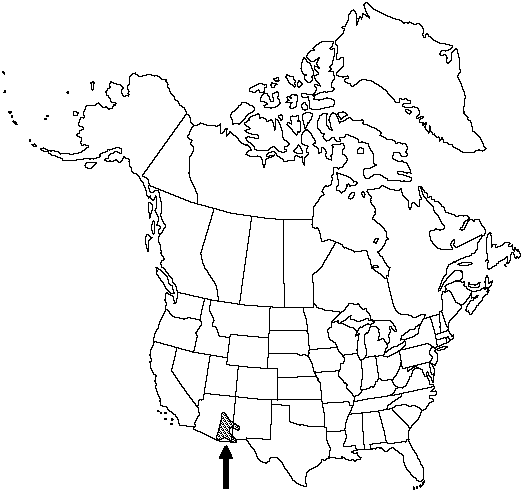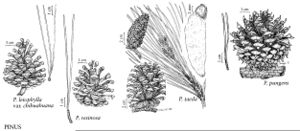Pinus leiophylla var. chihuahuana
Pines Mexico 14, plate 7, figs. 10, 11. 1909.
Trees to 25m; trunk to 0.9m diam., slender; crown conic, becoming rounded. Bark brown to redbrown, narrowly furrowed, cross-checked into long, irregularly and narrowly rectangular, flat, scaly ridges. Branches ascending; twigs slender, orangebrown or glaucous and violet, aging redbrown, ±smooth or cracking. Buds ovoid, light-redbrown, ca. 0.6–0.7 (–1) cm, slightly resinous. Leaves (2–) 3 (–4) per fascicle, spreading-ascending, persisting 2 years, 6–15cm × 0.8–1mm, straight to slightly twisted, dull gray-green, all surfaces with fine stomatal lines, margins finely serrulate, apex acute to acuminate; sheath to 1.5cm, shed early and completely. Pollen cones broadly ellipsoid, ca. 10–15mm, brown or yellow. Seed-cones maturing in 3 years, shedding seeds soon thereafter but long-persistent, paired or solitary, symmetric, lateral, narrowly ovoid before opening, broadly ovoid to nearly globose when open, 3.5–5 (–9) cm, chestnut-brown or greenish brown, aging gray to gray-brown, stalks to 1.5cm; apophyses slightly thickened and raised, not keeled; umbo central, slightly raised or depressed, with short, often deciduous prickle or unarmed. Seeds obovoid; body ca. 2mm, gray, mottled darker; wing ca. 10mm, dark-lined. 2n =24.
Habitat: Dry slopes and plateaus
Elevation: 1500–2500m
Distribution

Ariz., N.Mex., Mexico
Discussion
Pinus leiophylla var. chihuahuana is one of the few pines that produce sprouts from stumps. It differs from the type variety in its dark, less roughened bark, its shorter range of leaf length, and its slightly broader leaves that occur more consistently in threes. (The narrower, often longer leaves of the type variety are in fours and fives.)
The type variety, Pinus leiophylla var. leiophylla, is exclusively Mexican.
Selected References
None.
Lower Taxa
"relatively thin" is not a number.
